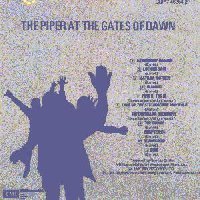
Syd (Roger) Barrett (1946-2006)
One summer, I bought Pink Floyd's Dark Side of the Moon album. I was only about the 20 millionth person to do so.
The following summer, I got their very first album, The Piper at the Gates of Dawn, which came out in the summer of 1967, shortly after the Beatles' Sgt. Pepper. I'd already heard a couple of Syd Barrett songs - "Arnold Layne", "See Emily Play" and "Bike", but Piper was my full immersion into the delirious world of Barrett's Pink Floyd- a music that promised magic, that broke off on unexpected turns, that celebrated chaos as chaos by throwing so much in there that it theatened to overwhelm the structures of the song, and yet he could make it all make sense in a strange kind of way. He wrote songs that painted impressionistic pictures in words and music. Many also showed his offbeat sense of humour. He had a playful way with words- he played with them, with their sounds, with the impressions they can leave in the mind.
That world of words and music survives on recordings, but in real life, it lasted for only a brief time. Soon enough, Barrett began to experience some sort of mental breakdown- unable to cope with the pressure he was under, muddled by drugs, finding it harder to deal with people, he began to withdraw into himself. His songs became darker and less coherent- but still evocative. Increasingly, he sounds lost and alone:
It's awfully considerate of you to think of me here,
and I'm most obliged to you for making it clear that I'm not here
("Jugband Blues")
That song, by the way, is an example of chaos starting to overwhelm form- it starts off quietly enough, but then gathers up manic momentum, before suddenly dissolving into sonic chaos, including the sound of a Salvation Army band playing apparently at random- which then screeches abruptly to a halt, whereupon the song returns to the quiet of the beginning only to end, abruptly, with the lines "And what exactly is a dream? And what exactly is a joke?".
After he was thrown out of Pink Floyd, he made a couple of solo albums, which have brilliant moments but too often he's clearly not together- he often can't focus enough to do a really good performance. Still, the songs themselves are great for the most part, with evocatively impressionistic lyrics, and the simple yet unconventional chord sequences that are a trademark of Barrett's songwriting style
He made no records after 1970, and did no shows after 1972. Although in later years he appeared to have recovered somewhat from his breakdown, he was no longer "Syd" ("Syd" was his nickname)- he was Roger- trying to live as ordinary life as he could under the circumstances, keeping to himself mostly. Dealing with people was not the easiest thing for him.
As a songwriter, Syd Barrett came up with only a small body of work, and certainly not a body of recognized "classics" that everyone knows (if not loves). His work is obscure and yet the subject of a fervent cult following. Why is this of any importance to me?
Somehow, what he did spoke to me and speaks to me deeply- that surreal, playful imagination shows me a way to be a creative person. There are other paths in, of course- but there was a time when I couldn't see any for me. It's great when you come across things that open up imaginable possibilities like that.


0 Comments:
Post a Comment
<< Home